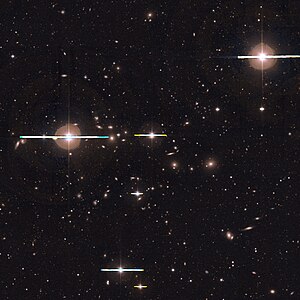Loading AI tools
Galaxie im Sternbild Großer Bär Aus Wikipedia, der freien Enzyklopädie
IC 919 ist eine elliptische Galaxie vom Hubble-Typ E im Sternbild Großer Bär am Nordsternhimmel.
| Galaxie IC 919 | |
|---|---|
 | |
| IC 919 (r.u.m.), IC 918-938 | |
| AladinLite | |
| Sternbild | Großer Bär |
| Position Äquinoktium: J2000.0, Epoche: J2000.0 | |
| Rektaszension | 13h 42m 47,5s [1] |
| Deklination | +55° 31′ 17″ [1] |
| Erscheinungsbild | |
| Morphologischer Typ | BrClG[2] |
| Helligkeit (visuell) | 14,8 mag[2] |
| Helligkeit (B-Band) | 15,8 mag[2] |
| Winkelausdehnung | 0,4′ × 0,4′[2] |
| Flächenhelligkeit | 12,9 mag/arcmin²[2] |
| Physikalische Daten | |
| Rotverschiebung | 0.035209 ± 0.000174[1] |
| Radialgeschwindigkeit | (19955 ± 57) km/s[1] |
| Hubbledistanz H0 = 73 km/(s • Mpc) |
(897 ± 63) · 106 Lj (274,9 ± 19,3) Mpc [1] |
| Geschichte | |
| Entdeckung | Edward E. Barnard |
| Entdeckungsdatum | Juni 1892 |
| Katalogbezeichnungen | |
| IC 919 • PGC 2507977 • | |
Das Objekt wurde im Juni 1892 vom US-amerikanischen Astronomen Edward Emerson Barnard entdeckt.[3] Die Identifikationen von IC 918, 919, 921, 922, 923, 925, 926, 928, 929, 930, 931, 932, 934, 935, 936, 937 und 938 sind sehr unsicher.
Seamless Wikipedia browsing. On steroids.
Every time you click a link to Wikipedia, Wiktionary or Wikiquote in your browser's search results, it will show the modern Wikiwand interface.
Wikiwand extension is a five stars, simple, with minimum permission required to keep your browsing private, safe and transparent.